The steel rebar market is projected to reach USD 154.08 billion by 2021, at a CAGR of 5.0% from 2016 to 2021. The demand for steel rebar can be attributed to the rising demand from different end users. Steel rebar in infrastructural projects is used for the construction of bridges, pavements, water sewage systems, airports, highways, and stadiums.
Ask for free sample report @https://www.marketsandmarkets.com/requestsampleNew.asp?id=176200687
Deformed steel segment is projected to be the largest and fastest growing segment in the steel rebar market by 2021
The major types of steel rebars are deformed and mild steel.
The deformed steel bar segment is the largest and fastest-growing segment by type in the steel rebar market. Deformed bar, formed from carbon steel and provided with ridges for better mechanical anchoring in reinforced concrete, is used in applications such as reinforced concrete slabs, cages, columns, prefabricated beams, and precast products. This deformation of the bar helps in increasing the bond between materials and minimizes slippage in concrete, which is fueling the rapid growth of the deformed bar segment.
Growth in this market is mainly attributed to the increasing steel rebar consumption in the construction industry. China and India are the key markets for steel rebar. China plans to invest around USD 720 billion in its infrastructural projects by the end of 2019. Similarly, there are a large number of infrastructural projects in the pipeline in India. In addition, strong policy initiatives such as the mandatory use of domestic steel in government infrastructural projects and ‘Make in India’ are expected to support the growth of the domestic steel rebar market.
Major market players covered in the report are ArcelorMittal (Luxembourg), Gerdau S.A (Brazil), Nippon Steel & Sumitomo Metal Corporation (Japan), Posco SS Vina, Co. Ltd (Vietnam), Steel Authority of India Limited (India), Tata Steel Ltd. (India), Essar Steel (India), Mechel PAO (Russia), EVRAZ plc (U.K.), Sohar Steel LLC (Oman), Celsa Steel UK (U.K.), Kobe Steel, Ltd. (Japan), Outokumpu Oyj (Finland), Acerinox S.A. (Spain), Hyundai Steel Company (South Korea), Daido Steel Co., Ltd. (Japan), and Byer Steel Group Inc. (U.S.).
